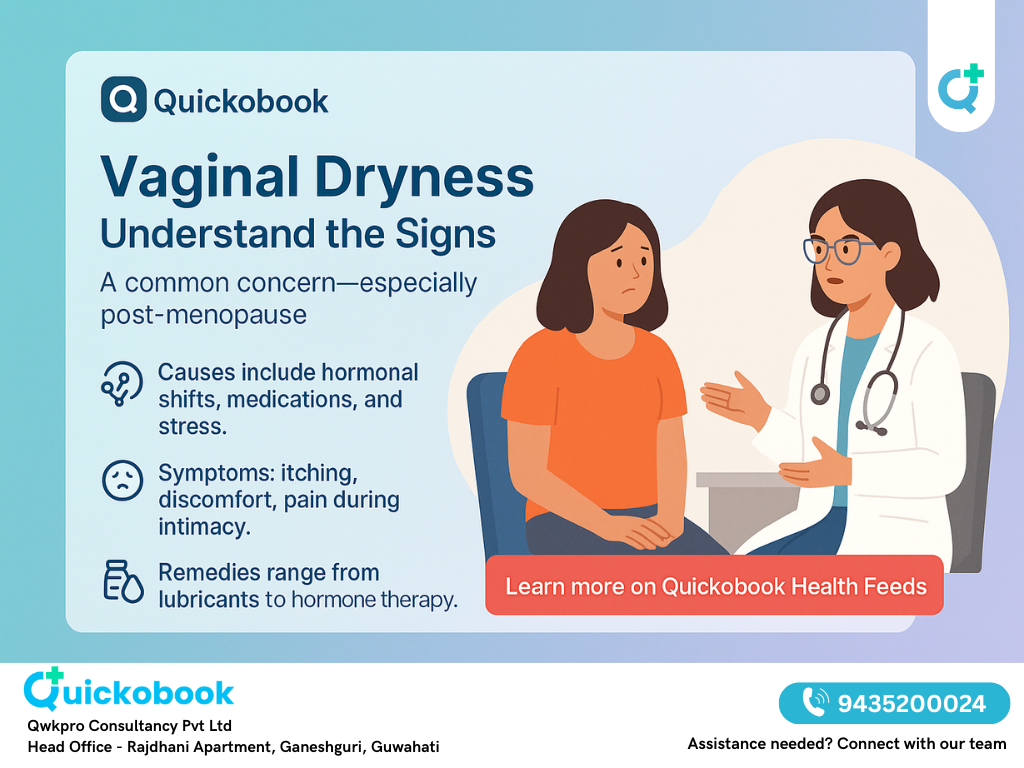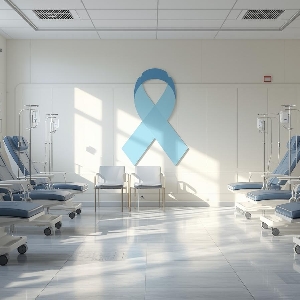Introduction
Vaginal dryness is a common yet often overlooked women’s health issue that can cause discomfort, itching, and painful intercourse. It is most frequently associated with Menopause, but it can affect women of all ages. Understanding its causes and treatment options is important for overall well-being. With the right guidance from a general physician or gynecologist, and safe access to medicines from a pharmacy, this condition can be managed effectively.
What is Vaginal Dryness?
Vaginal dryness refers to insufficient natural lubrication in the vaginal tissues. Normally, estrogen helps maintain elasticity and moisture. When estrogen levels drop, the vaginal lining becomes thinner and drier.
Causes of Vaginal Dryness
- Menopause – Low estrogen levels after menopause are the most common cause.
- Hormonal changes – After childbirth, during breastfeeding, or with certain contraceptives.
- Medications – Antihistamines, antidepressants, and cancer treatments.
- Medical conditions – Autoimmune diseases, diabetes, and infections.
- Stress and anxiety – Can affect sexual arousal and lubrication.
- Smoking and alcohol – Reduce blood flow and worsen dryness.
Symptoms of Vaginal Dryness
- Burning or itching in the vaginal area
- Painful intercourse (dyspareunia)
- Light bleeding after sex
- Recurrent urinary tract infections
- General discomfort or tightness in the vagina
Diagnosis
A gynecologist or general physician may:
- Take a medical history
- Perform a pelvic exam
- Suggest blood tests to check hormone levels
Remedies and Treatments
1. Over-the-Counter Remedies
- Lubricants: Used during intercourse to reduce friction.
- Vaginal moisturizers: Provide longer-lasting relief.
Available at any trusted pharmacy.
2. Medical Treatments
- Hormone replacement therapy (HRT) for menopausal women.
- Topical estrogen creams, tablets, or rings prescribed by a gynecologist.
3. Lifestyle and Home Remedies
- Stay hydrated.
- Avoid scented soaps and harsh chemicals.
- Practice pelvic floor exercises.
- Manage stress through yoga and meditation.
Prevention
- Regular sexual activity to promote blood flow.
- Stop smoking and reduce alcohol intake.
- Visit a general physician or gynecologist for annual health check-ups.
Risks and Complications if Untreated
- Chronic pain during sex
- Increased risk of urinary tract infections
- Relationship stress due to discomfort
- Lower quality of life
Conclusion
Vaginal dryness is common, especially during menopause, but it does not have to affect your daily life. With proper care from a general physician or gynecologist, and safe access to lubricants or hormone treatments from a reliable pharmacy, women can manage symptoms effectively. Quickobook makes it easier to book appointments and get professional advice.
50 Frequently Asked Questions (FAQs)
Q1. Is vaginal dryness normal during menopause?
A. Yes, it is very common due to low estrogen levels.
Q2. Can young women also get vaginal dryness?
A. Yes, it can occur at any age due to stress, medications, or breastfeeding.
Q3. Can vaginal dryness cause painful sex?
A. Yes, it is one of the most common symptoms.
Q4. Do lubricants cure vaginal dryness permanently?
A. No, they provide temporary relief but don’t treat the root cause.
Q5. Can a general physician treat vaginal dryness?
A. Yes, they can suggest remedies and refer to a gynecologist if needed.
Q6. Are moisturizers available in pharmacies?
A. Yes, vaginal moisturizers can be bought at most pharmacies.
Q7. Can vaginal dryness cause infections?
A. Yes, it increases the risk of urinary tract infections.
Q8. Do birth control pills cause dryness?
A. Some hormonal contraceptives can lead to dryness in certain women.
Q9. Can stress make vaginal dryness worse?
A. Yes, stress can lower arousal and worsen dryness.
Q10. Is hormone therapy safe for everyone?
A. Not always; only a gynecologist can decide based on health history.
Q11. Can dehydration cause vaginal dryness?
A. Yes, low water intake can worsen symptoms.
Q12. Are there home remedies for vaginal dryness?
A. Yes, hydration, pelvic exercises, and natural oils can help.
Q13. Can I use coconut oil for dryness?
A. Some women use it, but consult a doctor before trying.
Q14. Do antihistamines cause dryness?
A. Yes, they can reduce secretions and worsen dryness.
Q15. Is dryness permanent after menopause?
A. Not always; treatment can help relieve symptoms.
Q16. Can vaginal dryness lower libido?
A. Yes, discomfort can affect sexual desire.
Q17. Does smoking cause dryness?
A. Yes, it reduces blood circulation and worsens symptoms.
Q18. Can yoga help with vaginal dryness?
A. Yes, yoga helps reduce stress and improve blood flow.
Q19. Can vaginal dryness cause bleeding?
A. Yes, friction during sex can cause light bleeding.
Q20. Is dryness a sign of infection?
A. Not always, but infections can also cause dryness.
Q21. Can dryness occur during pregnancy?
A. Yes, hormonal changes can sometimes cause it.
Q22. Can alcohol worsen vaginal dryness?
A. Yes, excessive alcohol can dehydrate the body and worsen dryness.
Q23. Should I see a gynecologist for vaginal dryness?
A. Yes, especially if symptoms are persistent or severe.
Q24. Can vaginal dryness cause infertility?
A. No, but it can make intercourse uncomfortable.
Q25. Are estrogen creams safe?
A. They are safe for most women but should only be used under medical advice.
Q26. Can antidepressants cause vaginal dryness?
A. Yes, some may lead to reduced lubrication.
Q27. Do moisturizers and lubricants work differently?
A. Yes, moisturizers give long-term relief, while lubricants help during sex.
Q28. Can dryness improve with regular sex?
A. Yes, regular activity increases blood flow to the vagina.
Q29. Can dryness be a symptom of diabetes?
A. Yes, uncontrolled diabetes may contribute to dryness.
Q30. Is dryness common after childbirth?
A. Yes, breastfeeding lowers estrogen and can cause dryness.
Q31. Can vaginal dryness be cured?
A. It can be managed effectively with the right treatment.
Q32. Can dehydration alone cause vaginal dryness?
A. It may worsen symptoms but is not the sole cause.
Q33. Are water-based lubricants safe?
A. Yes, they are the safest option for most women.
Q34. Can dryness affect urination?
A. Yes, some women feel burning while urinating.
Q35. Do I need a prescription for lubricants?
A. No, most are available without prescription at pharmacies.
Q36. Can hormone therapy reduce dryness quickly?
A. Yes, it is very effective in postmenopausal women.
Q37. Can vaginal dryness cause anxiety?
A. Yes, the discomfort can affect mental well-being.
Q38. Is dryness linked to low estrogen only?
A. Mostly, but medications and stress also play roles.
Q39. Can I ignore mild vaginal dryness?
A. No, early treatment prevents worsening and complications.
Q40. Can vaginal dryness occur after chemotherapy?
A. Yes, cancer treatments often reduce estrogen levels.
Q41. Does vaginal dryness affect relationships?
A. Yes, it may cause stress if left untreated.
Q42. Can dryness go away without treatment?
A. Sometimes, but most women need some form of management.
Q43. Do gynecologists prescribe pills for dryness?
A. Yes, hormone therapy or vaginal estrogen may be prescribed.
Q44. Can exercise help reduce dryness?
A. Yes, regular exercise improves circulation and hormone balance.
Q45. Can I use petroleum jelly for dryness?
A. It is not recommended; use doctor-approved lubricants instead.
Q46. Are there herbal remedies for vaginal dryness?
A. Some herbs like soy and flaxseed may help, but consult a doctor first.
Q47. Can dryness affect sleep?
A. Yes, discomfort may disturb rest.
Q48. Is dryness linked to menopause only?
A. No, it can occur at any age.
Q49. Can a general physician prescribe estrogen creams?
A. Yes, they can prescribe or refer you to a gynecologist.
Q50. Can Quickobook help me find a doctor for dryness?
A. Yes, Quickobook connects you with general physicians and gynecologists easily.
READ ALSO: Effects Of Long-term Birth Control Pill Usage On Health
Quickobook Call-to-Action (CTA)
- Book an appointment with a general physician or gynecologist on Quickobook today.
- Find safe lubricants and moisturizers at trusted pharmacies.
- Get online consultations for menopause-related vaginal dryness.
Disclaimer
This blog is for educational purposes only. It does not replace medical advice. Always consult a general physician or gynecologist before starting treatments for vaginal dryness.









Comments (0)
No comments yet. Be the first to share your thoughts!
Leave a Comment